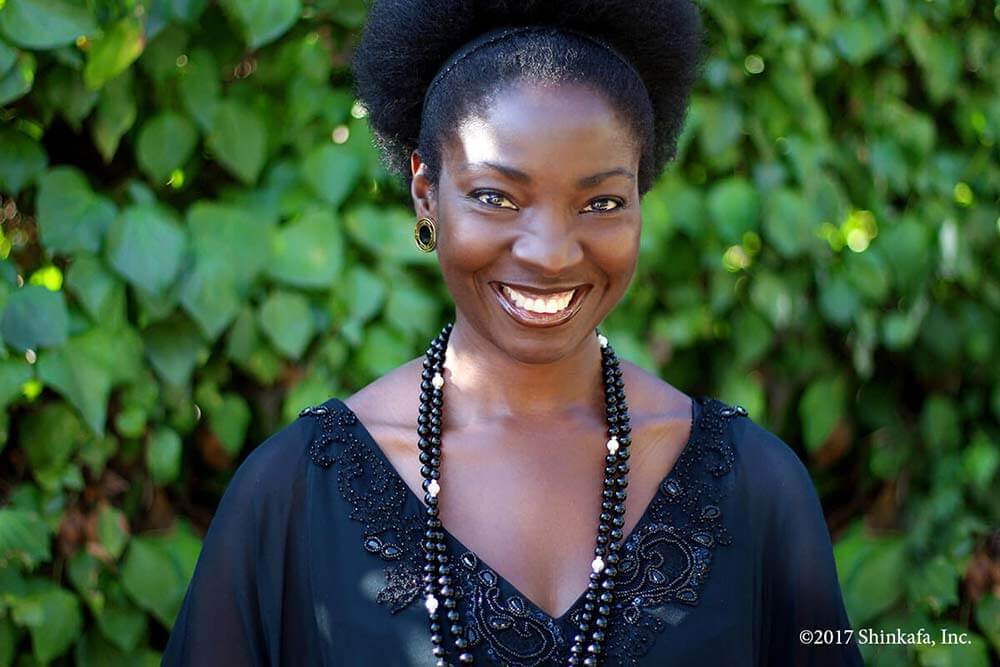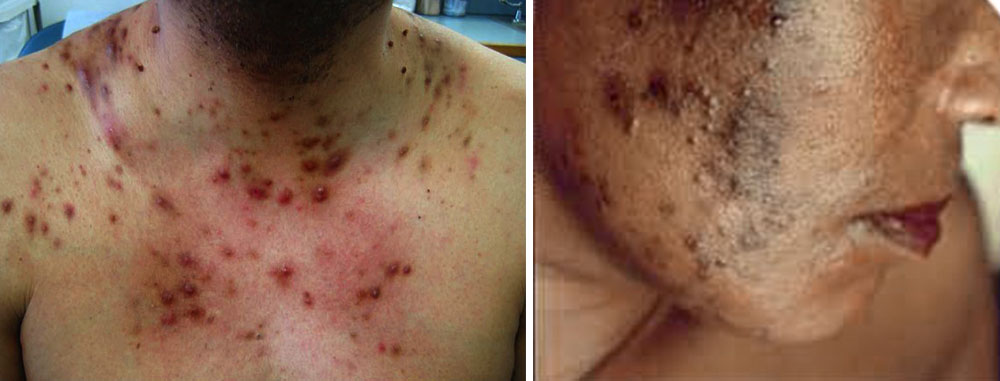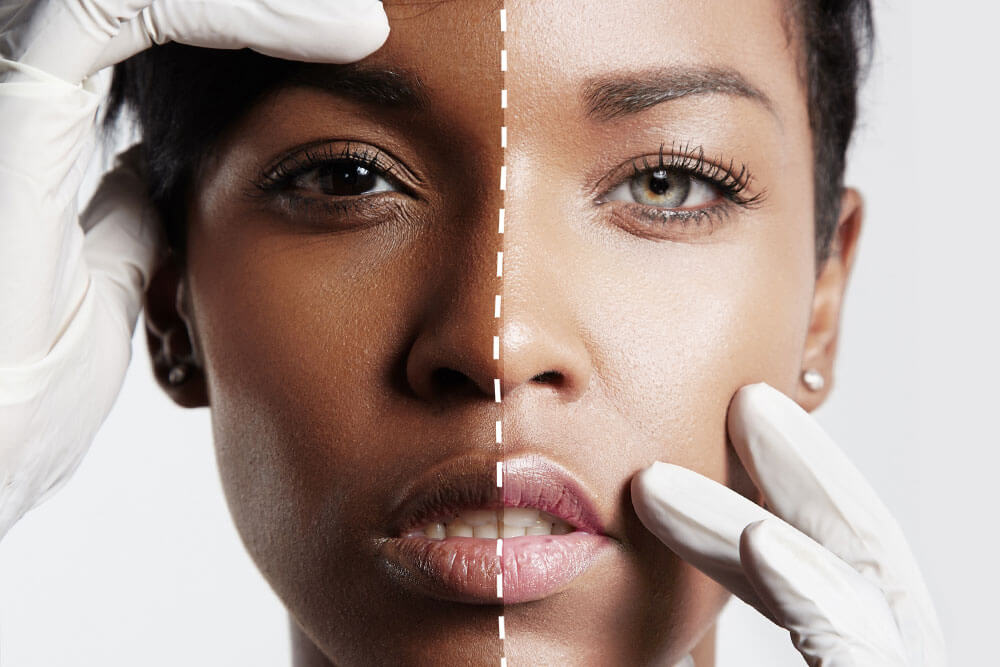
By Ngozi Bolin, Founder, Shinkafa Inc.
Please, please, PLEASE stop bleaching the bleep out of your skin. There. I’ve said it.
Science has spoken: Exposing yourself to bleaching agents can cause serious harm and even death; it’s why many ingredients related to bleaching have been banned across the globe. The United Kingdom and the United States continue to crack down on some of these bleaching agents. But if these bleaching agents are so harmful, why are they so popular? The Skin Bleaching industry is a booming market that is projected to grow to $31.2 billion by 2024 with the fastest projection being in the Asia-Pacific region.
Shinkafa’s motto is “do no harm.” Shinkafa’s core belief is in proper, daily and superior nourishment for the skin and hair without harmful chemicals. It is why we’re alarmed by this troubling skin bleaching trend. It is worth noting that while the trend is not new, the delivery methods are getting more extreme. While we at Shinkafa have advised our customers privately on this issue, we still get the same troubling questions and feel the need to devote an article to this topic.
The questions just keep on coming
“Does it lighten skin?”
“Is it for fair people?”
“Will it darken me?”
“I have darker parts of my body that I want to lighten, my bleaching cream stopped working.”
“My knuckles are darker than the rest of my body?”
“My knees need to be lighter?”
“Half of my body is darker than the rest?”
“Can it lighten me overnight?”
“I want it to whiten me!”
“I want your products to turn me into her color (pointing to an Asian model).”
“I want a stronger whitening cream.”
These and more are some of the distressing questions we get at Shinkafa from across the globe, but particularly from some African countries. To be clear, the majority of our customers in Africa reject bleaching outright. They may be in the minority, but they are a very devoted minority who are absolutely proud of their beautiful natural complexion but mainly seek superior products that nourish and enhance their beautiful skin. Then, we have another group of customers who have used bleaching agents in the past, knowingly or unknowingly, but now choose to use superior, effective and nourishing products like Shinkafa’s to help them deal with and repair cosmetic skin damage from prolonged use of those bleaching agents. Then, there is the third group that only wants to use bleaching products – the stronger the better. It is this third group that we address in this article. They come with questions and requests that go against our core value as a company. The volume of questions from this persistent group led to our decision to publish an article on this topic and to give our own answers in a more constructive and public way.
Many reasons have been articulated for and used to excuse and even justify this incredibly destructive and sickening trend of skin whitening, especially in Africa: some are personal and some are professional; some address insecurities, while some are due to a perceived advantage that having lighter skin gets you ahead. But, does it really matter? While we are not addressing the proper medical treatment as prescribed and monitored by doctors using these agents, what we areaddressing is the conscious decision to purchase poison and toxins for the sole purpose of cosmetically altering one’s skin color. Why is it okay to endorse and profit out of the willing consumption of toxins and poisons? A November 22, 2018 publication of Pulse Nigeria put this in a stark perspective. It starts by stating:
“Colorism exists, but vanity causes bleaching. It’s time to stop blaming our problematic trend on colorism and effects of colonialism, own your nonsense.” [emphasis supplied]
Someone give us an “Amen!”
Funnily (but not like in ha ha!), bleaching agents also have the side effect of darkening the skin even more. Bet you did not know that! The bleaching agents come in various forms that include: soaps, washes, skin oils, gels, skin cream, skin sprays, pills, supplements and injections.

While many countries across the globe have banned and regulated these bleaching agents, these bans and regulations have not stopped folks from seeking out and bleaching the @%$! out of their skins. Why on earth would one want to erode the epidermis of skin, damage vital components of the dermis and disrupt melanin production of the skin—in the tropics? The skin is the largest organ of the integumentary system of the body. Its main function is to serve as a barrier for all of the bad stuff and damage that can happen beyond the skin level such as loss of water or damages from outside. Knowing this, why would anyone want to harm the skin? Why would one use ones’ own money to buy diseases and possibly death? Extensive research has shown the devastating health consequences to these bleaching agents. According to a comprehensive 2008 paper captioned “Complications of Chronic Use of Skin Lightening Cosmetics”, the authors concluded that:
“[T]he complications of these products are very serious and are sometimes fatal. Some of these complications are exogenous ochronosis, impaired wound healing and wound dehiscence, the fish odour syndrome, nephropathy, steroid addiction syndrome, predisposition to infections, a broad spectrum of cutaneous and endocrinologic complications of corticosteroids, including suppression of hypothalamic-pituitary-adrenal axis.”
That magnificent paper was authored by eminent physicians from the dermatology unit of the College of Medicine, Lagos, Nigeria. They happen to be at the frontlines of this epidemic in the tropics. Clearly, their well-researched and articulated warnings have fallen on deaf ears. The numbers using bleaching products in Nigeria remain staggering. You are just as likely to find the average housemaid with a bright yellow face and very dark legs, just as you would her employer. That telltale sign of bleaching products’ use is referred to in some parts of Nigeria as “Fanta face, Coca Cola legs.”
This epidemic is so ugly that according to the BBC, pregnant women in Ghana have resorted to ingesting the pill forms of these bleaching agents, in the belief that their unborn children will have lighter skin color. Stop for a moment and consider this! This is depraved madness! The risks include damage to limbs and internal organs for the babies.
In a November 2016 publication with the US National Library of Medicine, National Institutes of Health titled “Skin Bleaching and Dermatologic Health of African and Afro-Caribbean Populations in the US: New Directions for Methodologically Rigorous, Multidisciplinary, and Culturally Sensitive Research”, the authors stated that:
“…besides the known dermatologic effects of skin bleach, such as dermatitis, exogenous ochronosis, and acne, we should also expand our focus to long-term health consequences such as cancer as well as interactions between physical and psychosocial health outcomes. The potential carcinogenic effects of this practice may not be solely limited to exposure to hydroquinone, a primary metabolite of benzene, which is not currently classified as carcinogenic to humans because of conflicting results, though recent evidence suggests that hydroquinone can generate DNA damages and immunosuppressive responses [18, 25, 26, 30–34]. Attention should also be given to potential increased susceptibility to skin cancer resulting from alterations of melanin production among those who practice skin bleaching, especially among populations living in tropical regions with strong UV radiation. While their darker skin is considered to be protective of sun-induced skin cancer, the carcinogenic effect of melanogenesis inhibition resulting from skin bleaching remains to be explored [35, 36].” [footnotes in the original]
This is not just an epidemic in Africa, as it is also pervasive in the USA, Europe, Asia and the Caribbean. In a lecture given by Dr. Andrew LeRoy Forde, a highly respected Dermatologist on March 12, 2019 called “Love Your Skin – The Dangers of Bleaching your Skin”, which he delivered at the Lloyd Erksine Sandiford Center in St. Michael, Barbados, Dr. Forde pointed out why hydroquinone was perhaps the biggest problem of them all. Hydroquinone kills melanocytes and prevents their regeneration thus, reducing the amount of melanin in the affected areas of your skin. The less melanin one has in the skin, the more vulnerable one is to damage caused by the sun’s ultraviolet rays. Tyrosinase is a copper-containing enzyme present in plant and animal tissues that catalyzes the production of melanin and other pigments from tyrosine, by oxidation. Dr. Forde concluded that “[T]he reason why hydroquinone works so well is that it inhibits that [tyrosinase].”
Then, there is the alarmingly dangerous rise here in the USA of vaginal and anal bleaching. This is yet another reason for women to feel insecure about themselves. Allure, in its December 5, 2018 issue, showed the upward trend for vaginal bleaching in both the United States and United Kingdom. The global nature of this bleaching epidemic suggests that bleaching is not confined to one racial group or simply based on an outward appearance of the face and body, as we also see with vaginal bleaching. But that requires a coordinated and global response across peoples, governments and nations to tackle the root cause of this problem.

Bleaching Creams, Hydroquinone, Mercury and Their Health Epidemic
Sadly, as we’ve noted, bleaching the skin continues to be a huge global business, particularly in Asia and Africa. For instance, the World Health Organization estimated that about 77% of Nigerian women use bleaching creams; similar reports, like the one by the Daily Times of Nigeria, only further strengthen this claim. Bleaching is a troubling and devastating trend in Nigeria with very harmful chemicals, including hydroquinone and mercury. The World Health Organization in 2011 has warned that these known carcinogen will have terrible consequences on the continent, if not already.
Nigeria’s National Agency for Food and Drug Administration and Control (NAFDAC) has banned the manufacture, sale and importation of creams and soaps containing mercury and hydroquinone “due to reported cases of adverse side effects and other health-related risks.” On August 2, 2002, NAFDAC re-emphasized the ban. Distribution of mercury-containing creams and soaps is also banned in the European Union, North America and in many African countries, including recent efforts by Rwanda to crack down on skin bleaching by deploying the police to enforce laws that are already on the books. So many have joined this global fight to eradicate bleaching agents, including one notable fight here in the USA by Minnesota’s public health advocate, Amira Adawe. Ms. Adawe’s fight is noteworthy, in particular, because she believes that bleaching is a symptom and not the cause. Her mission is to end the root cause of skin bleaching including, and particularly, the stigma against dark-skinned women. According to a recent interview with Ghanaian actress, Ella Menshah, she admitted to paying huge sums of money to get bleaching injections. Her main reason was that Nigeria movie producers and directors preferred lighter skinned women in the roles doled out.

Damages Caused By Skin Bleaching Agents
Just to be clear, the following is a list of just some of the known damages caused by bleaching agents. This list is by no means exhaustive:
- Skin cancer
- Ochronosis
- Bad revolting skin odor
- Hyperpigmentation
- Darkening of the skin
- Thinning of the skin
- Aged skin
- Dry and cracked skin
- Skin sores
- Damage to the ability of the skin to heal and regenerate itself
- Skin irritations
- Skin infections
- Mercury poisoning
- Kidney, liver or nerve damage
- Abnormalities in a newborn baby (if used during pregnancy)
Of all the destructive effects of these bleaching creams, the foul skin odor is the one that affects third parties who unfortunately find themselves in enclosed quarters with a skin-bleacher. The smell is foul, fish-like and unmistakably pungent. Some skin bleachers try to cover up the odor of skin bleaching with perfume or cologne, but it doesn’t work. Can you imagine sitting on a plane next to someone like that on a long flight! Then, there is obvious ugly pallor of bleached skin. It just never looks healthy, no matter how much makeup is used. It is worth noting that skin bleachers do not trust the look of their skin and tend to use a great deal of makeup, which comes with its own unique problems.
Most bleaching agents are listed and marketed as such. However, more and more, they are simply referred to in more “palatable” and benign terms. Consumers must remain vigilant, as a lot of unscrupulous marketing gimmicks are now used to “rebrand” these bleaching products as something they are not. They do so by co-opting terms that have significance in manners not intended for these poisons and toxins: “correcting,” “smoothing,” “spot correcting,” or “toning” are just some terms you should be mindful of. These bleaching agents, no matter how “rebranded”, are poisons and toxins that should be shunned and avoided.
There are reasons to believe that attitudes may be changing. There are reports in November 2018 that Blac Chyna’s proposed launch of her bleaching cream in Nigeria was met with outrage from many quarters. She reportedly partnered with a brand called “Whitenicious”. In a strange twist of irony in the name, the creator of the brand reportedly was trying to address her own hyper-pigmentation issues; but the growing epidemic of skin bleaching inspired others to bleach the &%$# out of their skin and privates with her product. The outrage was rather hypocritical to say the least, as some of the outraged continue to buy it and business is apparently booming. However, the first question that came to mind was, why on earth did Blac Chyna or anyone else consider Nigeria as a preferred fertile ground to plow for skin bleaching? Yup, you got that right! The market exists! Ms. Chyna’s entry into this foray simply lays bare what has been a distressing and deeply disturbing issue for a long while. Perhaps, this will work for the good.

What Remedies Are Available?
The problems caused by long term exposure to skin bleaching agents do not evaporate overnight, even when help comes quickly. It is important to get medical help as soon as possible. It is even more important to stop at once. For the cosmetic non-medical hyperpigmentation, cracked dry skin, premature aging and the other damage to the skin, we at Shinkafa can help.
For those that continue to lighten their skin, it is important that they take certain precautions. Remember that skin bleaching works by removing the natural protection that melanin provides to the skin. Additionally, skin bleachers must be sure to avoid the harmful chemicals that have been banned by most nations; integrate into their daily care a broad spectrum natural sunscreen, irrespective of the time of the day or year; avoid chemical sunscreens, sulfates and parabens; and avoid sun exposure as much as possible.
Shinkafa’s skin and hair care products are crafted with natural sunscreen ingredients. Our Shinkafa skincare line includes our ultra-hydrating and nourishing body wash; our ultra-nourishing, detoxing and hydrating body wash with charcoal; our soothing, calming magnificent body oil; our pigment-evening, hydrating and nourishing body oil with natural toning; our nourishing, hydrating and restoring with sun-protecting body cream with natural SPF; our restoring, nourishing and pigment evening body cream with natural toning; our perfecting and correcting stretch mark and blemish cream; our acne- and blemish-fighting and skin-tightening face masque; and face protector mousse that protects skin from the ravages of makeup while making it long-lasting and shine-free. We at Shinkafa do all these without harmful chemicals. Beauty must be free of harmful chemicals and toxins. Beauty must beautify and must do no harm.
Unfortunately, it appears the questions will continue to come. But they present teaching moments for us and for the customers asking these questions. If we cannot convince them to stop the insanity and take back their health and skin today, we can offer some relief in hopes that they will reconsider the use of these toxins and poisons. You are beautiful in your skin and do not let anyone tell you otherwise. For those that believe that such “beauty” is an investment into their future, we believe that a corresponding investment into funeral homes will be more apt. While we do not address it here, it will be interesting to find out the overall rate of cancer attributable to bleaching agents.
One burning question remains: What blame do the men have in this epidemic? We cannot look at society as an abstract. The overarching theme is that women who bleach do so to be found more desirable by men and thus make more “suitable” partners, girlfriend or wives. There is also the professional aspect to this as we noted above. Where is the outrage against these men? SMH!
Unfortunately it appears the questions will continue to come. But they present teaching moments for us and for the customers asking these questions. If we cannot convince them to stop the insanity and take back their health and skin today, we can offer some relief in hopes that they will reconsider the use of these toxins and poisons. You are beautiful in your skin and do not let anyone tell you otherwise. For those that believe that such “beauty” is an investment into their future, we believe that a corresponding investment into funeral homes will be more apt. While we do not address it here, it will be interesting to find out the overall rate of cancer attributable to bleaching agents.
One burning question remains, viz: What blame do the men have in this epidemic? We cannot look at society as an abstract. The overarching theme is that women who bleach do so to be found more desirable by men and thus make more “suitable” partners, girlfriend or wives. There is also the professional aspect to this as we noted above. Where is the outrage against these men? SMH!



Pingback: Vitamin D: Cancer, Heart, Bone & Skin Health | The Founder's Corner | Shinkafa Hair & Body
Pingback: Melanin and Sunscreen: What You Need To Know | Shinkafa Hair & Body Care